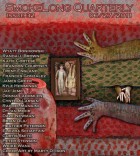Where did this story come from? What was your inspiration? Where did you find this little boy?
I find that often, when I finally write something, it’s a confluence of various impressions, ideas, experiences, and situations. I’ll soak up things that have happened to me, things that I’ve thought, and things that I’ve seen and, eventually, when the formula is right, the most salient of these will surface as a story. For “The Last Sight of Land,” my first influence was a trip by ferry to Dublin from Wales. I found myself thinking about immigrants of previous centuries — how much more difficult such a journey would have been and what it would be like to be on a ship for days, even months, moving to a new place you’ve never seen before. At the time I was also thinking a lot about growing up and the moments of realization that can occur in the first ten years or so of life. My sister has a ten month old baby, and her son’s entry into the world stirred up memories for me as I tried to imagine what it would be like for him to come of age in the world as it is today and as it will be in the future. All of these things were sort of mulling around within me when I found myself (I can’t remember why, it’s just the type of thing I find myself doing) reading a web page on Victorian humor. The joke about Betsy Flaherty jumped out at me and, suddenly, all of these themes — growing up, moving on, long journeys, loss, life, etc. — came together in the character of this small boy leaving home.
The sense of detachment is obvious. He has been taken from all he knows, then had even more taken from him. He is left with virtually nothing familiar. What do you think will become of him when they arrive? And firstly, do you think he will make it all the way there?
In my mind he will definitely make it all the way there, although I think any reader could make an argument to the contrary and they wouldn’t be any less right than I am. I like to think, though, that he’ll live a long life in the way that people did at that time — with quiet acceptance of the loss that seemed to be a contingent part of living. For me, the biggest question mark is the father. When I wrote the piece, I was less hopeful for him — I thought of him as kind of a lost cause, having suffered so much and, because of his more adult awareness and responsibilities, I didn’t see in him the resilience I saw in the little boy. However, now, I’d like to see more hope for him. While everything has slipped beyond the grasp of these two people, they still have each other, and the father had the wherewithal to get his son onto this ship and take him to a new place with the promise of a better life.
You tell the story without any direct dialogue, but I still find myself in the scene. Was it a conscious decision not to use dialogue, or just something that happened naturally with this character?
I think the boy acts as a silent observer in many ways, absorbing the experiences as a bystander rather than an active participant. Also, with a piece this short, too much dialogue can take away from the impact of the story.
You are studying for your MA in Creative Writing at Lancaster University in Northern England. Why did you choose Northern England?
I’ve always wanted to live in England. When the opportunity arose, I looked into programs and found a few promising ones. The program at Lancaster was especially attractive because it allowed a lot of freedom and flexibility in its schedule, so I could do some traveling and exploring while also getting a lot of writing done. I knew I didn’t want to be in one of the usual places in England (London, Oxford, Cambridge), preferring to go where there would be fewer tourists and, frankly, fewer Americans. Lancaster was perfect for this — the North of England is friendlier and more casual than the South, from my experience, and the city of Lancaster is fairly small and manageable.
How is the area (and university) treating you? What is comfortable? What is strange?
The area is great. I love England and I’m also right near the Lake District, where a lot of authors have lived and worked, including Wordsworth and Coleridge. I’m very comfortable with most of the culture, although there is a focus on class here that we don’t really have in America — we have socioeconomic divisions, of course, but the “American dream” of social mobility and fluidity among the classes turns out to be fairly true in comparison to England, where one’s accent or dress or school can pigeon hole one for life, no matter how much wealth or knowledge might be acquired in that time.
On a more frivolous note, the food here is also pretty bad, although I do love a good fish and chips.



 The SmokeLong Grand Micro Contest (The Mikey) is now an annual competition celebrating and compensating the best micro fiction and nonfiction online.
The SmokeLong Grand Micro Contest (The Mikey) is now an annual competition celebrating and compensating the best micro fiction and nonfiction online.